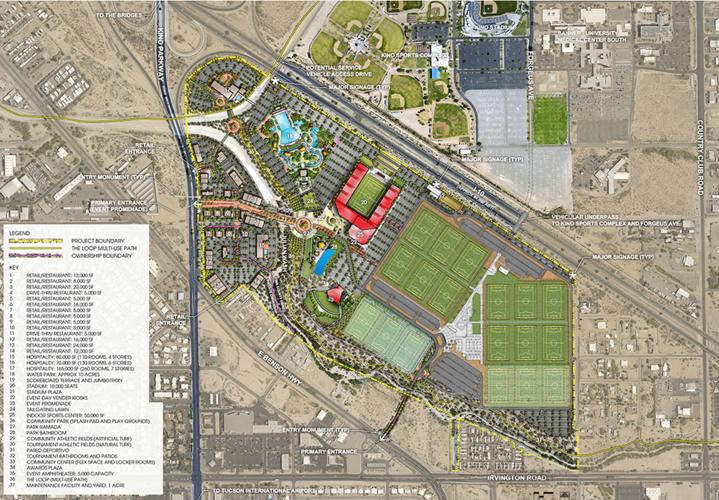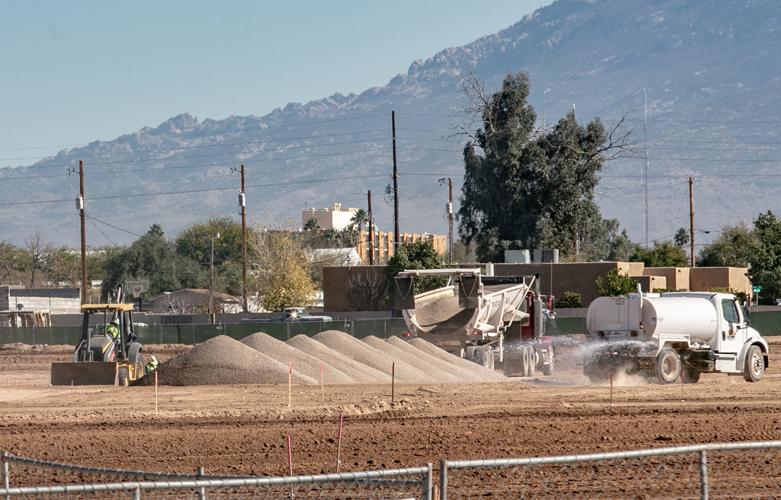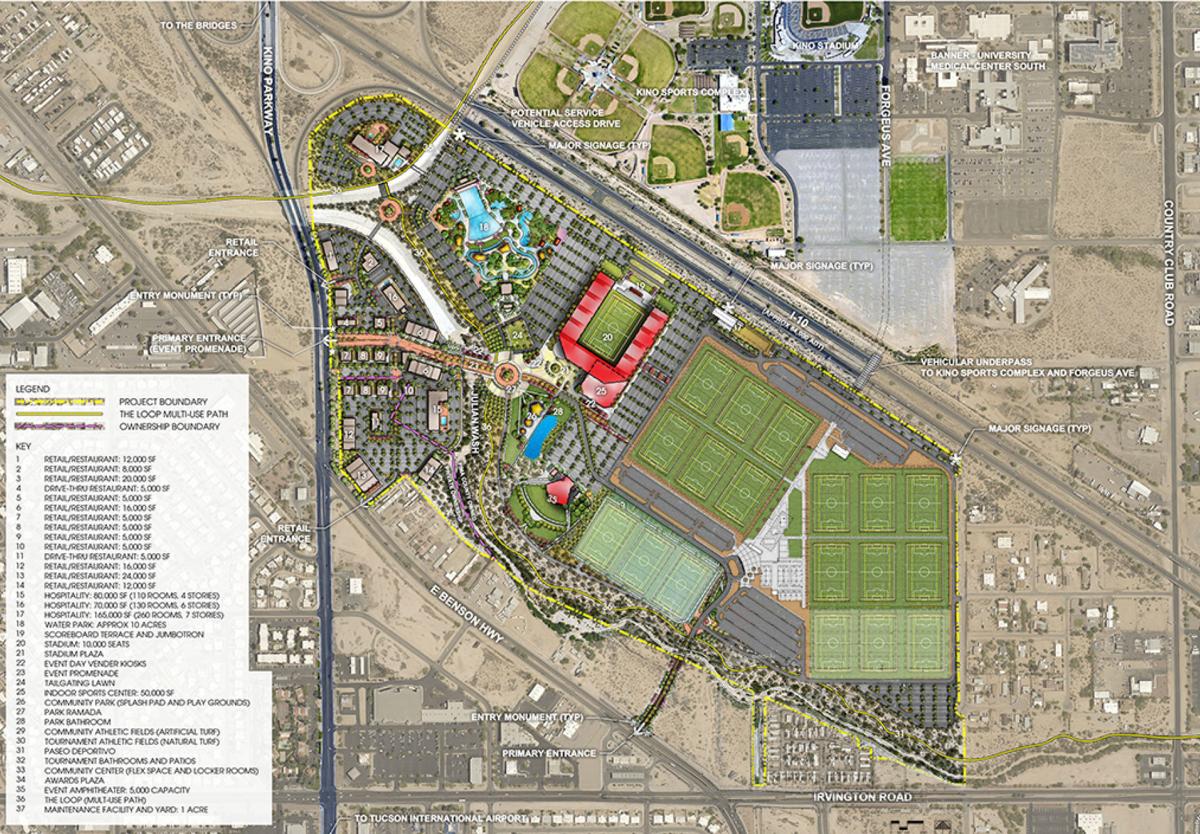A new top-of-the-line sports facility being built on Tucson’s south side is expected to generate millions in revenue while providing premium play space for local athletes as well as regional and national sporting events.
In early December, the Pima County Board of Supervisors approved a $9.6 million funding increase for an expansion of Kino Sports Complex, adding 145 acres south of the existing 155-acre complex.
Construction for the first phase of development has already begun and will include facilities for 12 natural grass, sand-based multiuse fields, parking and an entrance from Benson Highway. The first phase also includes 20 pickleball courts and related infrastructure, including concessions, lockers and an area for players and vendors.
Phase 1, which has an estimated construction cost of $26 million, is slated for completion in early 2020.
The funding for the project comes from the county’s issuance of certificates of participation, which will be sold to investors and repaid later with Stadium District revenues, including car rental surcharge and hotel bed taxes.
The county anticipates total construction and operation costs of $57.8 million through the first five years, with a return of $109 million during the same period.
The expansion is poised to change the face of sports in Pima County while generating millions of dollars in hotel stays, as the upgraded facility will put Tucson in the running to host regional and national tournaments in soccer, football, lacrosse and rugby.
The project isn’t a new one. The Pima County Board of Supervisors approved an economic development plan in 2012 that cited diversification of sports attractions as a goal. Updates to the plan in 2015 and 2016 approved funding for the expansion of Kino South Sports Complex.
The idea behind the expansion — in addition to providing a top-of-the-line sports facility for local families and athletes — is to use sports attractions to drive tourism, a move that has proven effective in other locations.
Last year, the U.S. Youth Soccer Region 1 Tournament held in Virginia had an estimated economic impact totaling $15 million across three counties, according to a memo from Pima County Administrator Chuck Huckelberry.
“I’ve been here for about three years now, and in that time, we’ve made a very concentrated effort to get a number of different activities going,” Reenie Ochoa, the Pima County Stadium District director, told the Star. “Although soccer is a big portion of what we have, it also happens to be the least amount of field space that we had after spring training left.”
Baseball and soccer events in February and March already have existing fields booked to capacity, with Kino Sports Complex experiencing a “full house” each spring as Major League Soccer’s preseason and international baseball descend on Tucson. Ochoa is hopeful that the expansion will lead to year-round bookings for Kino facilities.
The expansion will also allow the complex to branch out from solely hosting field sports and engage players in new and upcoming games, including pickleball.
“Pickleball is not just for seniors anymore,” Ochoa said of the sport, which combines elements of badminton, tennis and ping pong. “It’s a growing sport and there’s a very good nucleus of pickleball players here in Tucson and Green Valley, the climate being what it is. It’s taken off exponentially.”
The pickleball community reached out to county officials to express interest in building a pickleball tournament location, Ochoa said.
“We said, ‘OK, let’s build this the right way,” Ochoa said, adding that the pickleball tournament facility will have concessions and ticket booths on site.

Construction on the southern expansion of Kino Sports Complex is underway. It will include 12 natural grass fields.
EXCITEMENT BUILDING
Officials have already heard from a rugby organization and collegiate and national soccer groups who have expressed interest in Pima County submitting proposals to host events in 2020 or submitting their own requests to use the new fields, Ochoa said.
“Even though we don’t have grass installed yet, the excitement is out there and we’re hoping that’s going to continue,” Ochoa said, adding that she’s hopeful the first year will be booked with big events before its scheduled opening in the spring of 2020.
The county’s Capital Planning and Economic Impact departments are finishing up details for Phase 2 of the project, including requests for proposals in commercial and retail development.
“We’d love to see this be kind of a destination location. It’s one of the things that’s kind of missing at the existing complex — we don’t have a hotel right on site,” Ochoa said. “Having something right here adds to the enticement for big events to come here as part of their headquarters location. That and having different things for people to do when they do come here.”
The Phase 1 rendering shows a water park, which Ochoa said is a placeholder. While a water park might end up at the complex, it’s still open for people to present ideas to the county on what they believe would be a quality entertainment-type attraction, Ochoa said.
The master plan for the project also includes six additional natural turf, multi-use fields, additional recreational turf fields for community use, an event amphitheater with 5,000 seats and a 10,000-seat outdoor stadium. Future commercial areas are also planned for the site, including retail, hotel and restaurant development.
The expansion has received support from local organizations, including the Arizona Soccer Association, Pima Community College, the University of Arizona, the Tucson Sugar Skulls and Visit Tucson.
“It’s a potential game-changer on so many levels, to include our ability to bring more events to Tucson at a state level” Rick Kelsey, chief executive officer of Arizona Soccer Association , told the Star. “Right now, the kids are having to travel to Phoenix on a pretty consistent basis to play in some of our more advanced leagues, in part because the lack of availability of top-end fields.”
While Tucson already hosts a few “significant” youth soccer tournaments, including the Tucson Association of Realtors Fort Lowell Shootout and the Pima Cup, bringing larger tournaments to town could have a huge impact on the local economy.
Last year, the U.S. Youth Soccer regionals were held in Salt Lake City, generating $7 million for the city, including 10,000 hotel room night stays, Kelsey said.
“What it will give us the opportunity to do, is to provide quality fields and quality facilities for kids to play on and people to use,” Kelsey said. “When you look at it from an adult level and down to the youth level, hopefully this will give us the opportunity to bring more of Pima County and Tucson into the game.”
But not everyone is excited about the expansion. Pima County Supervisors Steve Christy and Ally Miller were the two dissenting votes in the Dec. 4 Board of Supervisors vote to increase funding, with Christy saying he believes the stadium complex business should be left to the private sector.
“As long as I can remember, in regards to Kino Stadium and that whole complex, there’s always been this dark cloud over it,” Christy said. “There’s always been something related to it that never really seemed to be on the up-and-up.”
Christy suggested that the ballpark should have perhaps been built downtown, but ended up on Tucson’s south side instead. In 2010, Major League Baseball spring training left Kino, and revenues plummeted.
“It’s been felt by so many people in the community that it’s been a drain and hasn’t had the success that it’s been touted to have,” Christy said. “Why is the county in the stadium complex business? Shouldn’t that be more directed to the private sector and developers who will sink their own money into it, rather than sinking taxpayers’ money into it?”
It’s also about optics, Christy said, adding that the “run-of-the-mill” Pima County resident doesn’t care about the details, they simply see the county investing a large amount of money into a sports complex that’s been yet to be successful, while local roads are in “deplorable” states.
After MLB spring training left, Kino Sports Complex revenues dropped from $1.2 million per year to $100,000 or less. But by adding soccer into the mix and opening up the complex for other sports and community events in recent years, revenues have increased to roughly $2.9 million per year, according to Huckelberry’s memo.
County officials expect revenues to increase significantly, perhaps even doubling, when the expanded complex opens in 2020.






